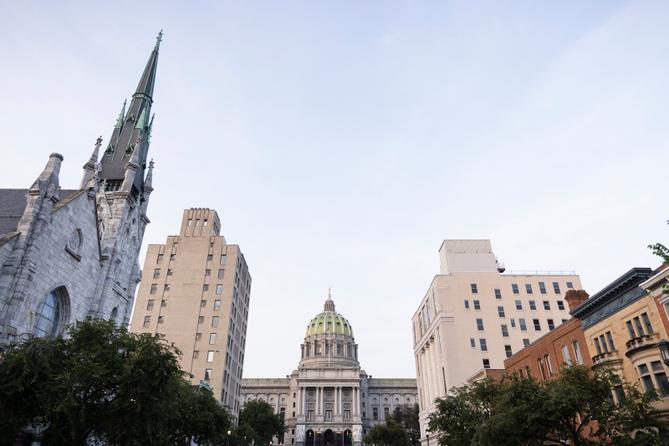HARRISBURG — As the Pennsylvania legislature prepared to pass sweeping updates to the state’s public records law in 2008, a state senator stood during the floor debate to single out a bedrock of the bill.
The landmark measure, said the late state Sen. Jim Ferlo of Allegheny County, would “make correspondence between legislators and lobbyists public documents.”
“I think,” Ferlo told fellow senators at the time, “this is certainly a cornerstone piece of legislation in regard to the … organizations that have professional paid lobbyists, the significant role they play in the drafting, formulation, and passage of pieces of legislation in lobbying both Houses of the Capitol.”
Ferlo’s remarks were resurrected this December during oral arguments in a high-stakes public records lawsuit, brought by Spotlight PA, over precisely those records. The case could, for the first time, result in the public gaining access to emails between the legislators who make laws and the lobbyists who try to influence them.
The case pits the news organization against the Pennsylvania Senate, which last year denied a request under the state’s Right-to-Know Law for emails between lawmakers and a group of lobbyists. Spotlight PA had requested the correspondence as part of its investigation into allegations of political corruption in the city of DuBois, which had employed lobbyists and received generous state grants.
The state Senate swiftly and summarily denied the request, asserting that emails do not fall under one of the 19 categories of records that the legislature must make public under the law. Those categories, which largely encompass financial records, are unique to the legislature. When crafting the 2008 law, state lawmakers purposely exempted themselves from having to disclose numerous documents that the executive branch routinely makes public.
Spotlight PA appealed, arguing that a clause within the Right-to-Know Law provides public access to lobbyist-lawmaker correspondence. The case is now before Commonwealth Court.
The clause is included in a section of the law that deals with records that are exempt from disclosure. It says that “correspondence” between lawmakers and constituents that would identify the person or the reason they are writing is exempt — except when the correspondence is between lawmakers and lobbyists.
The state Senate hired a private law firm to fight the appeal. The chamber’s lawyer, Karl S. Myers of Stevens & Lee, told a panel of Commonwealth Court judges that because emails are not specifically included in one of the 19 categories of legislative records that are public, Spotlight PA’s records request should be rejected.
“End of discussion,” he said.
Myers suggested that requests could be made to state agencies for emails between lobbyists and lawmakers. Those state agencies, he said, might have to disclose them.
“It doesn’t make sense to ask a commonwealth agency for legislative records,” countered Jim Davy, founder of All Rise Trial & Appellate and one of the attorneys representing Spotlight PA.
Davy argued that the state Senate’s “categorical interpretation” that no emails can ever be released is wrong. The law’s legislative history — including Ferlo’s comments — makes it clear legislators understood that at least some of their emails with lobbyists could be made public, he said.
At the very least, said Davy, the state Senate should determine if there are records that are both responsive to Spotlight PA’s request and included in the 19 categories of legislative records. That would include items such as financial records that appear in email exchanges.
Several judges peppered Davy and Myers with questions during the half-hour-long arguments. Judge Patricia McCullough, in particular, appeared to push back on the state Senate’s interpretation, asking at one point why the legislature added the clause regarding lawmaker-lobbyist emails unless it meant to make those public.
President Judge Renée Cohn Jubelirer called the case “very intriguing.”
A decision in the case is likely to take months.
Editor’s note: Couloumbis is the Spotlight PA reporter who sought the emails between legislators and lawmakers, and who appealed the case to Commonwealth Court.
